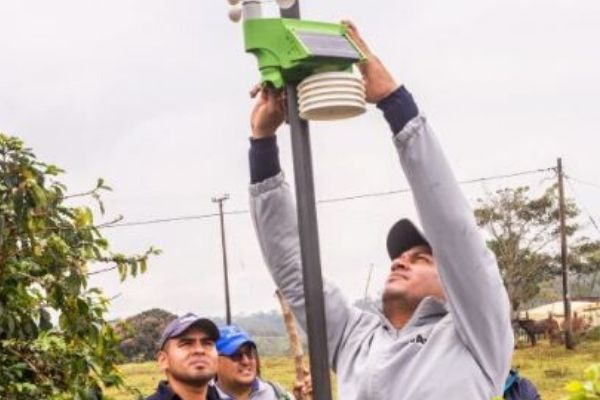In the last three months the project “Technological Transformation: improving the life of coffee growers in Colombia” has been transformed. The management of important alliances, the support of entities such as the Sustainable Agriculture Platform SAFE, the IDB and other advances towards the development of a model that transcends the successful experience that we have been able to witness in the Meta at the hands of our allies, has led to now be called “Tierra Colombia: Technology Transformation“, in line with the product developed by Lavazza and marketed under this seal. This change nevertheless retains the original spirit and aims and promoted by the Lavazza Foundation and managed by ALO and MAKAIA, since the beginning of the activities in 2016.
Obeying the new challenges that we have raised in this phase, we have managed to consolidate a more structured work team to respond to the demands of the project and the territory, now counting with two ICT facilitators in the field located in the municipalities of Mesetas and Lejanías respectively and the latter also covering the activities proposed in San Juan de Arama. In addition, we have designed our activities to impact new beneficiaries as well as work with coffee farmers and teachers, we contemplate new components dedicated to women and an important work with young people from the community.
For this reason, today it is a source of joy to be able to document a new milestone: the installation, between February 5th to 10th, of 5 sensors and IoT devices (Internet of Things) on the farms where we counted on TVWS connectivity and that allow to know more precise information and in real time of the crops, like temperature, humidity, soil conditions, among others; and the deployment of a first version of an app designed for coffee farmers to access all these data, which are available even remotely.
This technological advance has been the fruit of a work developed with the support of XFarm, Italian technology company for agriculture, which was selected to develop the technical implementation of the project and who have helped us move towards this new phase that incorporates agriculture from precision, improving the productivity of the farms through the implementation of the information and data platform to train coffee producers on topics such as agricultural information, health and education, among others. The devices generate alerts every thirty minutes and are able to provide additional information, so the coffee producer can make decisions and perform a traceability of their coffee crop. The platform is also intended to provide information in real time about market prices, climate, temperature, among others. This demonstrates the enormous transformative potential of information about people’s lives, a component in which MAKAIA firmly believes and for which we are proud to be part of this great commitment, with important allies such as Lavazza and ALO and collaborations of Carcafé, Microsoft and SAP.
In the next few days the training/technological appropriation activities will begin and for this we continue advancing in the design of relevant ICT content adapted to the needs of the community, likewise we will initiate 6 “innovation laboratories” for young people; while we work to improve and maintain connectivity in the best conditions. The laboratories will be developed in schools, farms and 4 local public libraries to encourage co-creation activities, problem solving and develop tests of technological ideas. Young people have a key role in these laboratories because they will help rural coffee producers to adopt technology and will be inserted into the productive process, this time having with advanced technological tools.
Tierra Colombia: Technology Transformation is a project by Lavazza Foundation, operated by ALO y MAKAIA, with support from SAFE. In partnership with Carcafé, National Spectrum Agency, Ministry of ICT, SAP and Microsoft.


